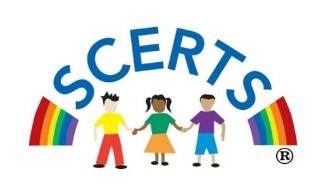Whole School Approach
Interoception
Interoception is the sense which helps us to notice our internal body signals - such as when we are hungry, cold or anxious or excited. Many pupils struggle to notice and make sense of their body signals, which impacts on their ability to correctly 'read' their emotional states.

An interoception curriculum is embedded into our Grange Park Time and Intervention lessons throughout the school. Pupils will revisit the curriculum several times during their time at Grange Park School, as developing interoceptive awareness is a lifelong learning journey. We use the curriculum devised by Kelly Mahler to focus on ‘noticing’ a different body part each week, before moving on to ‘connecting’ these body signals to emotions and then taking ‘action’ to regulate.
For more information, please see:
https://www.kelly-mahler.com/what-is-interoception/
https://www.autism.org.uk/advice-and-guidance/professional-practice/interoception-wellbeing
SCERTS

SCERTS is embedded across all year groups at Grange Park School. SCERTS assessments are completed in line with the EHCP process to show progress that pupils have made in their social communication and emotional regulation and help us set relevant and developmentally appropriate targets for each individual.
-
SCERTS is a family-centred approach designed for autistic pupils. The whole team around the pupil is involved in the assessment. This comprises of teachers, learning mentors, the therapy team and, of course, parents / carers.
-
It enables us to create a plan based on our knowledge of the core developmental challenges faced by autistic pupils.
-
The aim is to create meaningful and motivating goals for pupils based on functional needs and family priorities.
-
SCERTS provides specific guidelines to help pupils become competent and confident social communicators and active learners.
What does SCERTS stands for?
SC - Social Communication: understanding how and why our pupils communicate with others
ER - Emotional Regulation: understanding how, why and when our pupils self-regulate and their ability to accept support from others to co-regulate
TS - Transactional Support: the use of supports to help the people supporting the young person (family members, teachers, therapists) respond to their needs and interests, modify the environment, and provide tools to enhance learning
What does the data tell us so far?
We have been using SCERTS at Grange Park School since 2017. The data shows improvements in Social Communication and Emotional Regulation across all year groups in the school, with the greatest improvement in Social Communication. Further analysis of social and emotional growth profiles show that Flexibility and Resilience is the most improved indicator across year groups. Re-assessment is completed annually to track pupil progress.
SPELL
At Grange Park School we follow the National Autistic Society’s (NAS) SPELL framework to provide an individualised and strengths-based approach for all our pupils.
SPELL stands for:
Structure – a consistent approach, providing predictability and order
Positive (approaches and expectations) – using pupils’ strengths and having realistic expectations, supporting pupils to develop their independence
Empathy – a truly person-centred approach ensuring that staff know the pupils well and use relevant strategies to support them
Low arousal – keeping the environment calm and clutter free, being mindful of individual sensory preferences and needs
Links – strong links in the whole team around each pupil, including the pupil themselves, parents, teaching staff, therapy staff and any external agencies involved
For more information on the SPELL framework, please see the NAS website:
https://www.autism.org.uk/what-we-do/autism-know-how/training/the-spell-framework
